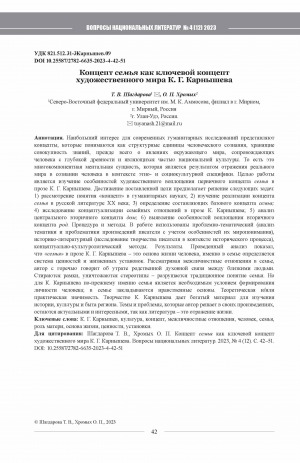Место работы автора, адрес/электронная почта: Северо-Восточный федеральный университет им. М. К. Аммосова, Политехнический институт (филиал) ; 677013, г. Якутск, ул. Ойунского, 14 ; e-mail: tv.shagdarova@s-vfu.ru, tuyanash.21@mail.ru ; https://www.s-vfu.ru/
Область научных интересов: Народное образование, педагогика
ID Автора: SPIN-код: 1649-3990, РИНЦ AuthorID: 1070952
Количество страниц: 11 с.
The family theme is one of the leading themes in world and Russian literature, revealing the relationship between "fathers" and "children". In Russian literature, the family acts as the moral foundation of human existence. The most famous Russian writers - Alexander Pushkin, Mikhail Lermontov, Leo Tolstoy, Dmitry Fonvizin, etc., emphasized the importance of the family, because it is the family that asserts moral principles, instills general cultural values that are passed down from generation to generation, and also has a direct impact on character, beliefs, life and the fate of the country. Currently, the concept of concept is actively used in various humanities. Linguists (Arutyunova, Stepanov, Boldyrev, etc.) and literary critics (Askold, Lotman, Zusman, Likhachev, etc.) have been engaged in the study of the concept. Concepts in literature (artistic concepts) re ect not only the peculiarities of mentality of a nation or ethnic group, they combine the peculiarities of the writer's worldview, as well as the individual associations of each reader. The purpose of this work is to study the concept of family as a basic concept of Russian literature in the 20th century. Research objectives: 1) consideration of the concept of "concept" in the humanities; 2) the study of the implementation of the concept of family in Russian literature in the 20th century; 2) the de nition of the components of the basic concept of family. Procedure and methods. The paper uses problem-thematic, historical-literary, and conceptual-cultural methods. The analysis showed that the family is the basis of human life, it is in the family that the system of values and life attitudes is determined. Considering the relationship in the family, many authors focus our attention on the problem of the loss of kindred spiritual ties between relatives and close people. Gradually, boundaries are being erased, stereotypes are being destroyed - the destruction of the traditional concept of the family. However, writers still single out the family as a necessary condition for the development of a person's personality, since it is in the family that the moral foundations are laid. The work of writers in the 20th century provides rich material for studying the history, culture and way of life of the Russian people. The themes and problems that the authors solve in their works remain relevant and interesting, since literature is a re ection of life.
Шагдарова, Т. В. Семья как базовый концепт русской литературы XX века / Т. В. Шагдарова, О. П. Хромых ; Северо-Восточного федерального университета им. М. К. Аммосова, Политехнический институт (филиал) // Вестник Северо-Восточного федерального университета им. М. К. Аммосова. Серия "Вопросы национальных литератур". - 2024, N 2 (14). - С. 43-53. - DOI: 10.25587/2782-6635-2024-2-43-53
DOI: 10.25587/2782-6635-2024-2-43-53
Количество страниц: 10 с.
The concepts that are understood as structural units of human consciousness that store a set of knowledge, primarily about the phenomena of the surrounding world that have accompanied a person since ancient times and are part of the national culture, are of the greatest interest for modern humanitarian research. That is, it is a multicomponent mental entity, which is the result of re ecting the real world in a person's consciousness in the context of ethno- and socio-cultural speci cs. The aim of the work is to study the features of the artistic embodiment of the primary concept of family in the prose of K. G. Karnyshev. The aim of the work is to study the features of the artistic embodiment of the primary concept of family in the prose of K. G. Karnyshev. Achieving this goal involves solving the following tasks: 1) consideration of the concept of "concept" in the humanities; 2) study of the implementation of the concept of family in the Russian literature of the 20th century; 3) de nition of the components of the basic concept of family; 4) study of the conceptualization of family relations in the prose of K. Karnyshev; 5) analysis of the central secondary concept of the house; 6) identi cation of the features of the embodiment of the secondary concept of the genus. Procedure and methods. The paper uses problem-thematic (analysis of the themes and issues of the writer's works, taking into account the peculiarities of their worldview), historical and literary (the study of the writer's creativity in the context of the historical process), conceptual and cultural methods. Results. The analysis showed that the "Family" in K. G. Karnyshev's prose is the basis of human life, it is in the family that the system of values and life attitudes is determined. Considering interpersonal relationships in the family, the author speaks bitterly about the loss of a kindred spiritual connection between close people. Frames are being erased, stereotypes are being destroyed - the traditional concept of family is being destroyed. But for K. Karnyshev, it is still the family that is a necessary condition for the formation of a person's personality; moral foundations are laid in the family. Research implications. The work of K. Karnyshev provides rich material for studying the history, culture and life of the region. The themes and problems that the author solves in his works remain relevant and interesting, since literature is a re ection of life.
Шагдарова, Т. В. Концепт семья как ключевой концепт художественного мира К. Г. Карнышева / Т. В. Шагдарова, О. П. Хромых ; Северо-Восточный федеральный университет им. М. К. Аммосова // Вестник Северо-Восточного федерального университета им. М. К. Аммосова. Серия: Вопросы национальных литератур. - 2023. - N 4 (12). - С. 42-51. - DOI: 10.25587/2782-6635-2023-4-42-51
DOI: 10.25587/2782-6635-2023-4-42-51

